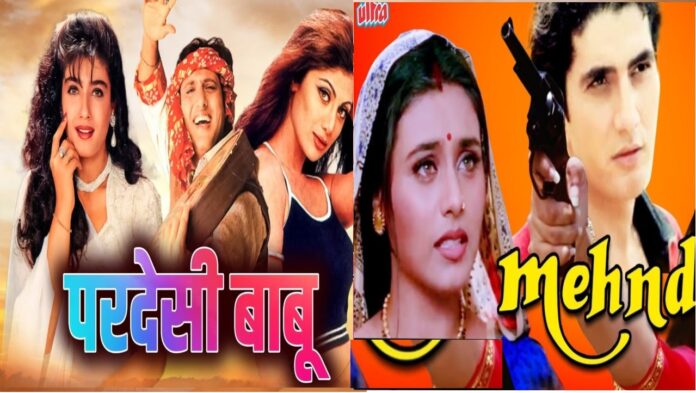PARDESI BABU
K.B. Pictures’ Pardesi Babu is a love triangle with the tried and tested turns and twists. A simple and poor village boy falls in love with a rich girl, but the latter’s father asks him to earn a crore of rupees in one year if he wants his daughter’s hand in marriage. The boy takes up the challenge and also succeeds, but he has achieved his target because of an unintentional windfall which has made a girl and her father extremely poor. This girl silently loves the boy who, because of the windfall, feels obliged to marry her instead of the girl he loves. Several misunderstandings later, the boy and his rich girlfriend unite in matrimony.
The story has no novelty and reminds one of a number of love stories like Maine Pyar Kiya. But what is more shocking is the screenplay which is one of utmost convenience and which resorts to too many cinematic liberties. For instance, there is a thief who comes as an important link in the story in the pre-climax. This thief is first seen in Bombay, and in the pre-climax, in Darjeeling. This cinematic liberty is sought to be covered up by showing the thief to be an “all-India chor”! Similarly, the Darjeeling girl, whose father has lost lakhs of rupees he was carrying in a suitcase, has not even bothered to open the suitcase she gets in exchange for their own suitcase, for one full year — not even to try and locate the owner of the exchanged suitcase for a possible clue. Besides the main story, even the incidents are of the kind seen in earlier films.
The romance between the village simpleton and the rich city girl has not been developed properly. Emotions touch the heart only at one place. Comedy is a bit too loud. Dialogues (Aadesh K. Arjun) are good at several places but the sermonising by the hero in the end is a bit boring.
Govinda does a good job but one misses his crazy comedy. Raveena Tandon is fair but looks extra weak. Shilpa Shetty is reasonably good. Satish Kaushik is too loud at many places, but entertains when not loud. Shashikala is ordinary. Rajeev Verma, Mohnish Bahl and Avtar Gill lend fair support. Virendra Saxena is irritating, more because his character is not very convincing if only because what he is doing doesn’t appeal. Asif Sheikh, Deepak Qazir, Gavin, Aroon Bakshi, Charlie and the rest fill the bill.
Debut-making director Manoj Agrawal has faltered in the selection of the story and has not really worked on the script but he seems to be good at the technique of direction. Music (Anand Raaj Anand) is quite entertaining. ‘It happens only in India’, ‘Chingari’ and a couple of other songs are well-tuned. Action scenes are effective. Camerawork is good. Production and other technical values are fair.
On the whole, Pardesi Babu is an ordinary fare.
Released on 13-11-’98 at Minerva and 23 other cinemas of Bombay thru Mahalakshmi Film Distributors. Publicity: very good. Opening: quite good (affected due to Sharjah cricket final). …….Also released all over.
MEHNDI
Aftab Pictures (P.) Ltd.’s Mehndi (UA) is a film on dowry and about a woman’s fight against the curse of dowry. A law graduate gets married only to be ill-treated by her in-laws and husband, for dowry. She bears a lot of humiliation but finally resolves to seek revenge when she is called a prostitute by her in-laws and when her husband files a divorce petition in the court. It is then that she dons the advocate’s robe and pleads her own case. She wins the support of the villagers too.
The first half is ordinary. It shows the bride being tortured for dowry and does not impress very much. The drama becomes lively after interval when she decides to pay back her in-laws for all their torture. Once she sets out on her revenge mission, there are some scenes which entertain and a few which win audience sympathy. Dialogues are good and even clapworthy at places.
Rani Mukerji does a good job as the wronged daughter-in-law. Faraz Khan is wooden and, therefore, does not impress. Shakti Kapoor is fair. Arjun acts ably. Himani Shivpuri is convincing as the wicked mother-in-law. Pramod Moutho is so-so. Joginder entertains a bit. Ushma Rathod, Shashi Sharma, Mahavir Shah, Shagufta Ali, Ashish Nagpal and Mukta provide ordinary support. Shahbaaz Khan leaves a mark in a guest appearance. Other guest artistes — Gulshan Grover, Asrani, Raza Murad and Yunus Perwaiz — pass muster.
Direction is fair. Music should have been much better. Two songs are alright but what was needed was one or two hit tunes. Even the songs which appeal do so more for their lyrical value. Song picturisations are ordinary. Camerawork is okay. Other technical aspects are alright.
On the whole, Mehndi has some appeal for womenfolk and can do well in small centres only.
Released on 13-11-’98 at Dreamland and 10 other cinemas of Bombay thru Friends Movies. Publicity: good. Opening: dull. …….Also released all over.
TELUGU FILM INDUSTRY FEELS IGNORED IN FORTHCOMING IFFI
The Telugu film industry lodged a strong protest with the organising committee of the International Film Festival of India against their ignoring the contribution of versatile actress Bhanumati Ramakrishna and woman director Vijayanirmala.
The 30th IFFI will commence in Hyderabad from 10th January, 1999. The first meeting of the 30th IFFI, held on 11th November with Andhra Pradesh chief minister N. Chandrababu Naidu in the chair, evoked angry protests from personalities of the Telugu film industry such as Akkineni Nageswara Rao, D.V.S. Raju, U. Visweshwar Rao, Dasari Narayana Rao and T. Subbirami Reddy, who took exception to the organising committee for ignoring the Telugu film actress and director. The issue cropped up when festival director Malati Sahai informed that in honour of the contribution made by women to the film industry, the IFFI had decided to screen five films of Hindi film actress Shabana Azmi to commemorate her completion of 25 years in cinema. It was pointed out that Bhanumati had completed 50 years in Telugu cinema, and Vijayanirmala was the only woman director to have directed over 100 films.
The meeting also expressed displeasure with the organising committee for not providing representation to the Telugu film industry in the various sub-committees constituted by the Directorate of Film Festivals and the I & B ministry to oversee and organise the festival.
Malati Sahai informed that about 75 films from 33 countries, produced in the last two years, would be screened at the festival. Santosh and Sapna cinemas would screen mainstream cinema films.
CENSOR NEWS
Santoshi Productions’ China Gate, seen on 9th, has been passed with UA certificate, with 14 minor cuts.
Ram Creations’ Doli Saja Ke Rakhna (length 4833.24 metres in 17 reels), applied on 9th and seen on 10th, has been passed with U certificate, with minor cuts.
Pali Films’ Bhoot has been refused certificate.
NFDC Ltd.’s Hanste Hasaate (revised) has been passed with U certificate, with cuts.
Bhalla Productions’ Tune Mera Dil Le Liya has been passed for adults, with cuts by the revising committee.
Tension Marks ‘Pardesi Babu’ Deliveries
Release Plans Disturbed
The release of Pardesi Babu on Thursday (12th November) in U.P., Orissa, C.P. Berar, C.I. and Nizam (Aurangabad) had to be cancelled following delivery problems. The film opened all over only on Friday. In some centres, even the first shows of Friday had to be cancelled as the prints could not be reached there on time.
The hassles in the delivery of Pardesi Babu were one of the worst in recent times. The Bihar territory was in dispute since a long time due to double-sale by producer Kulbhushan Gupta. While that matter was resolved in the court in favour of the first distributor (Pawan Dhanuka) and did not result in delay in effecting deliveries, what did cause delays were some developments during the week. Even before that, financier Madan Kapoor of Jalandhar obtained an injunction order from the Jalandhar court, staying the all-India release of Pardesi Babu. The stay order was vacated when Kapoor was paid interest on monies lent by him to Gupta and he agreed to the refund of principal amount at the time of release of Vidroh.
The negative of Pardesi Babu had during its making been transferred in the name of Jumani who had financed the film. It was the recovery of his monies and those of some other financiers alongwith him that was creating a problem. The recoveries from the various distributors fell short of the claims of the financiers and this was brought to light too late in the day. The Overseas delivery was effected as late as on Tuesday (10th November) evening, only after a legal notice was served on the producer by Overseas distributor Mohan Chhabria.
The distributors of Bombay, C.P. Berar, C.I., Rajasthan and Nizam even decided to go to court to get deliveries at the contracted prices. Even while the matter was about to be moved in court, frantic efforts were being made for an out-of-court settlement. Distributors of the various circuits were being prevailed upon by both, Jumani and Kulbhushan Gupta, to agree to price hikes, but most of them were in no mood for it. The West Bengal distributors are said to have even threatened to cancel their release if the producer/financier insisted on a price hike.
Ultimately, it took the intervention of CCCA president Santosh Singh Jain to make the producer, financiers and various distributors as also the laboratory arrive at a settlement. Santosh Singh Jain was in Jaipur and following an SOS message sent to him, he flew to Bombay on Wednesday night. He drove straight from the airport at 9 p.m. on Wednesday to Dharamsi Savla’s (one of the financiers) office where the warring parties had assembled. By the time Jain Sahab stepped in, the concerned parties had spent several sleepless nights and undergone hours and hours of tension and uncertainty. An amicable — if one may use the word — settlement was first arrived at at 5 a.m. on Thursday! Prices were hiked.
Prakash Advani of Shree Bableshwar Films, Indore, sighed after the settlement, “This has been my worst experience ever. The producer was simply not bothered about us and our commitments. On Wednesday night, a day before the film was to have opened in C.I., Mr. Kulbhushan Gupta, instead of being bothered about our deliveries, told me, ‘Why are you so tense? Sab thheek ho jaayega.’ But time was running out. We had already lost Thursday, did he want us to lose Friday too?” According to Advani, had Gupta told the distributors in advance about the price hike, they would’ve come prepared to take delivery. “Mr. Gupta did not even tell us of the price hike, it was Jumani who conveyed the news to us. When we distributors told Jumani that we had dealt with Kulbhushan Gupta and not him, he told us, he was the negative rights holder. We were shocked.”
Kulbhushan Gupta told Information, “We went over-budget because of the many outdoor shooting schedules and the delay in completing the film. We also suffered a loss of about Rs. 50 lakh in just the music rights sale when they were transferred from Big B Music to Super Cassettes.” But couldn’t the last-moment tension have been averted? Replied Gupta, “The accounts revealed a heavy deficit only this week.” He denied rumours that he had burdened Pardesi Babu with the liabilities of his other two under-production films, Vidroh and Shivam.
Many Questions!
Any Answers?
Some pertinent questions arise out of the entire delivery tamasha of Pardesi Babu.
(1) How did Adlabs transfer the film’s negative in Jumani’s name when it had already issued lien letters on various territories to various financiers? If it did so, wasn’t the transfer subject to clearance of the liens?
(2) When negative rights are transferred in a person’s name after liens on various territories have been created, doesn’t the negative rights holder step into the producer’s shoes and become responsible together with the laboratory to clear the liens?
(3) Why were distributors asked to get clearance from the new negative rights holder, Jumani, when they had dealt with producer Kulbhushan Gupta and had not even interacted with Jumani before the time of delivery?
(4) Reportedly, Manmohan Shetty tried to dilly-dally the effecting of deliveries till Jumani’s money was received in full. Can a laboratory owner insist that all distributors take deliveries together? Why couldn’t one distributor take delivery on one day and another on another day?
(5) Why were the distributors asked — or rather, forced — to pay Rs. 10,000 extra per print? This is nothing short of cheating!
(6) There was one financier who had a first-release claim but even his money was not sought to be returned before Jumani’s money. Is this legally correct?
(7) When the Bombay, C.P., C.I., Rajasthan and Nizam distributors had almost knocked the doors of the court to have their deliveries effected as per agreements, why did they retract at the last moment? Why did they opt for out-of-court settlement and thereby agree for hiked prices when the chances of their victory in court were bright?
“This is extortion – my distributors have paid 70 lakh as extortion money,”
Cries SANTOSH SINGH JAIN
Santosh Singh Jain may have succeeded in making the parties to the Pardesi Babu dispute arrive at a settlement, but he is very unhappy with what happened in the case. Information spoke to him and obtained his version.
“It is very sad, the way things are going. We cry about extortion but this arm-twisting at the last moment is nothing short of extortion. The Pardesi Babu distributors have been forced to pay Rs. 70 lakh by way of ‘extortion money’.
“I blame the producer first for not managing his affairs properly. Next to be blamed are the various financiers like Jumani, Pramod Rai (of Hyderabad) etc. who were not prepared to see that the film had simply no strength to bear the burden of their unreasonable interest. They should not have lent money on the project if they were so concerned about its safety. Perhaps, at the time of lending, they were lured only by the high interest rate. I am also very disillusioned by the behaviour of Manmohan Shetty of Adlabs. In the first place, he should have been careful when he realised that the negative was being transferred in another name. Shetty also brought the claim of Kulbhushan Gupta’s earlier film, God And Gun, on Pardesi Babu. My question to him is, ‘Why should the distributors always bear the burden of everything — past, present and future? Why are they made the bakras always?’ I was so agitated at one point during the settlement talks that I told Manmohan Shetty, ‘I have a good mind to complain to the police commissioner about this extortion racket.’ I’ve known Shetty for many years but I’ve never seen him so uncooperative and stubborn.”
MANMOHAN SHETTY:
“It is only when things reach a boiling point that negotiations start.”
Adlabs boss Manmohan Shetty, when contacted, told Information, “Well, the film has released and I’m happy for that.” Explaining why such delivery dramas take place, Shetty said, “Normally, the producer, financier and distributors play the wait-and-watch game to see who will increase/reduce the price/interest. Things reach a boiling point and then they become too hot to handle. Then, negotiations start but it is invariably too late.” When asked to comment on why Santosh Singh Jain was so agitated by his role in the dispute and settlement, Manmohan Shetty replied, “Santosh Singh Jain is not important. He is nobody in the Pardesi Babu case. I had to go by what the film’s financiers, producer and distributors wanted, not by what Jain wanted me to do. If what settlement was arrived at by Santosh Singh Jain was not implemented and remained merely on paper, how am I expected to effect deliveries?”
3-E
Education-Entertainment-Enlightenment
A Fitting Reply
Apropos our survey of distributors a few weeks ago, in which Dreamland was cited as one of the worst-maintained cinemas in Bombay, here comes the clarification from the cinema owner himself. Says Yunusbhai Sopariwala, “Actually, over the past 3-4 months, we have brought in a number of improvements at Dreamland at a cost of over Rs. 35 lakh. We have installed Dobly DTS sound system. Besides, two additional air-conditioning plants have been added to the existing one. Moreover, the entire balcony area has been renovated with new seats and granite flooring while the stalls area is currently under renovation. All these improvements have certainly been appreciated by the family audience. Otherwise, Dulhe Raja, a family film, couldn’t have fetched a share of Rs. 11.35 lakh in its 9-week run at Dreamland.” Distributors may please take note.
Lovely Chhamma Chhamma
Rajkumar Santoshi should thank Bharat Shah and Anu Malik. For, while it was financier Bharatbhai who insisted that there be at least two songs in China Gate, it was Anu Malik who composed those songs. The result is the racy Chhamma Chhamma song which is fast becoming popular and, by the looks of it, seems, it will be the relief-providing item in the action drama. Urmila Matondkar has danced beautifully to the beats of the foot-tapping number. Maybe, now even Rajkumar Santoshi must be thanking his stars for having heeded the request of Bharat Shah. For, had it not been for Bharatbhai, China Gate would have remained a songless film. Incidentally, the film’s promotional trailer screened at the China Gate party held on 12th November at Hotel Centaur, Bombay, gave enough indication of the film’s grandeur. And the excitement of those distributors of the film who’ve seen its trial gives an indication how well it must’ve shaped up. In the meantime, the public is waiting for the China gate to open — on 26th/27th November.
Me Badshah, You Ghulam
As if the telecast of new films on cable TV channels is not bad enough, producers have started selling satellite TV rights of their successful films a bit too soon. Distributors of Mukesh Bhatt’s Ghulam are pretty agitated with Bhatt for having sold the telecasting rights of Ghulam to Star TV, that too when the film was released less than just six months back. The film will be aired on the satellite channel very shortly. This, when even its first run in the various circuits is not as yet complete. It is truly a selfish move on the part of Mukesh Bhatt to be ignoring the interests of his distributors like that. It’s not done, Mr. Bhatt.





























